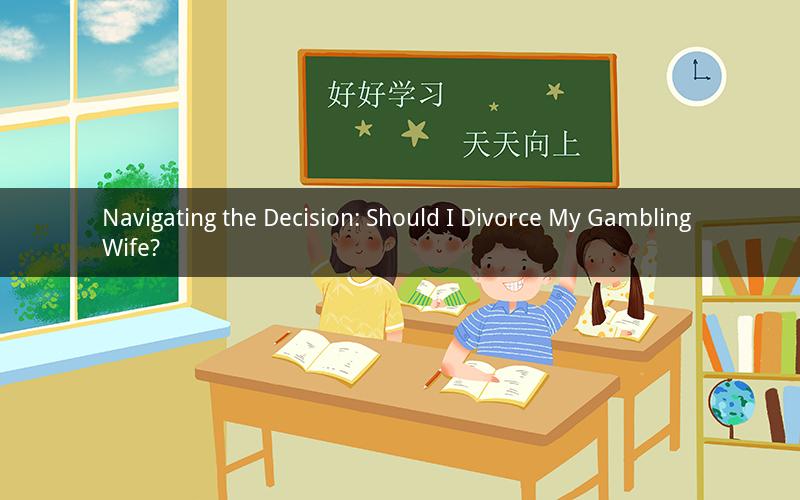
Introduction:
The question of whether to divorce a gambling spouse is one that many individuals face. It's a complex issue that involves emotional, financial, and personal considerations. In this article, we will explore the various aspects to consider when contemplating a divorce due to gambling addiction.
1. Understanding the Problem:
To determine whether divorce is the right choice, it's essential to understand the severity of the gambling addiction. Signs of a gambling problem include hiding debts, lying about gambling activities, and neglecting responsibilities. If the addiction is causing significant distress and affecting your relationship, it may be time to reconsider your options.
2. Assessing the Impact:
Consider the impact of the gambling addiction on your life. Has it led to financial instability, emotional turmoil, or damaged relationships with children or family members? Understanding the consequences of the addiction will help you make an informed decision.
3. Seeking Professional Help:
Before making any decisions, it's crucial to seek professional help. A therapist or counselor can provide guidance on how to address the addiction and offer support for both you and your spouse. Therapy can also help you explore the underlying issues contributing to the gambling problem.
4. Communication and Support:
Open and honest communication is key in any relationship. Discussing your concerns with your spouse can be challenging but is necessary to address the addiction. Seek support from friends, family, or support groups to help you navigate this difficult situation.
5. Legal and Financial Considerations:
Divorce involves legal and financial implications. Consult with an attorney to understand the process and potential outcomes. Consider how the divorce will affect your financial stability and how to divide assets and debts.
6. Evaluating Your Relationship:
Reflect on the health of your relationship. Has the gambling addiction caused irreparable damage, or is there still a chance for healing and recovery? Consider the possibility of counseling or marriage therapy to save your marriage.
7. Personal Values and Beliefs:
Consider your personal values and beliefs regarding marriage and divorce. Some individuals prioritize loyalty and commitment, while others may prioritize self-preservation and well-being. Reflect on what is most important to you and how it aligns with your choices.
8. Long-Term Outlook:
Think about the long-term consequences of staying in the marriage versus seeking a divorce. Consider the potential for recovery and whether your spouse is willing to undergo treatment and change their behavior. Evaluate if the marriage can ever be the same or if it's time to move on.
9. Emotional Well-being:
Your emotional well-being should be a top priority. If the gambling addiction is causing you extreme emotional distress, it may be necessary to prioritize your mental health and seek a divorce for your own peace of mind.
10. Acceptance and Moving Forward:
Ultimately, the decision to divorce your gambling spouse is a personal one. It's important to accept your decision and focus on moving forward. Seek support from friends, family, or professionals to help you navigate the emotional and practical aspects of the divorce process.
Questions and Answers:
1. Q: Can my spouse's gambling addiction be cured?
A: While there is no guaranteed cure for gambling addiction, treatment and support can significantly improve an individual's chances of recovery. It's important to seek professional help and be patient with the recovery process.
2. Q: How can I support my spouse during their addiction recovery?
A: Support your spouse by being patient, understanding, and encouraging them to seek professional help. Educate yourself about gambling addiction to better understand the challenges they face. Be there for them during both good and bad times.
3. Q: Will divorce improve my financial situation?
A: Divorce can have both positive and negative financial implications. It's essential to consult with a financial advisor or attorney to understand how the divorce will affect your financial stability. Seek ways to secure your financial future, such as creating a budget and exploring legal options.
4. Q: Can marriage counseling help save my marriage?
A: Marriage counseling can be beneficial in addressing underlying issues and helping couples work through their problems. However, it's important to have realistic expectations and consider whether both parties are committed to the process.
5. Q: How can I cope with the emotional impact of my spouse's gambling addiction?
A: Coping with the emotional impact of a gambling addiction can be challenging. Seek support from friends, family, or professionals. Engage in self-care activities, such as exercise, meditation, or hobbies, to help manage stress and improve your emotional well-being.